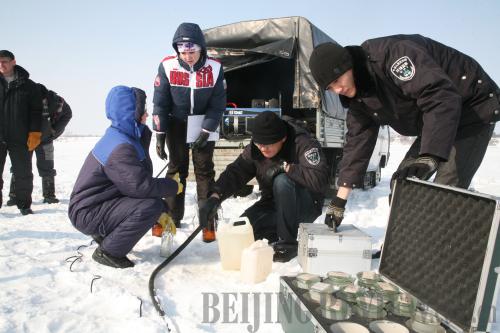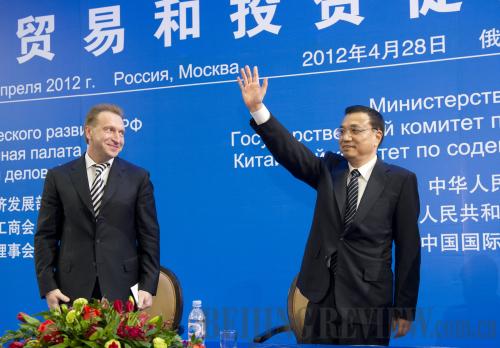|
 |
 |
|
ENVIRONMENTAL COOPERATION: Environmental experts from China and Russia carry out water-quality monitoring along their border in the Heilongjiang River on February 28 (IC) |
TRADE PROMOTION: The then Chinese Vice Premier Li Keqiang (right) and Russian First Deputy Prime Minister Igor Shuvalov attend a meeting on China-Russia trade and investment in Moscow on April 28, 2012 (HUANG JINGWEN) |
Practical cooperation
China and Russia have become each other's major and most important strategic partners, and both accord priority to their relationship in their overall diplomatic agenda and foreign policy. Before Xi's visit, China and Russia already felt comfortable and confident in the current status of their relationship. And they are very sure that there's still great potential to develop and deepen cooperation in the future.
China and Russia are important neighbors and partners to each other, said Chen Yurong, a researcher in Russian studies with the China Institute of International Studies (CIIS). And both are permanent members of the UN Security Council.
After 20 years, the China-Russia relationship has grown into a comprehensive strategic partnership of coordination. The two sides have completely settled their long-stranding boundary dispute, placed their political ties on a solid foundation and supported each other in issues concerning their respective core interests, Xi concluded on March 19.
During the past two decades, China and Russia have formed a highly scaled mutual trust. Newly appointed Chinese Premier Li Keqiang concluded on March 17 that no political obstacles remain, and there is nothing that cannot be discussed between the two sides.
Both parties issued a joint statement during Xi's visit, aimed at pushing forward their bilateral relationship alongside the newly signed 2013-16 Sino-Russian Treaty of Good Neighborliness and Friendly Cooperation. The plan will serve as a guideline for bilateral cooperation in the coming years.
While maintaining close political trust, the two sides have deepened trade and economic cooperation. China has remained Russia's top trading partner during the past three years, while Russia is China's seventh biggest trading partner. Their bilateral trade volume hit $88.16 billion in 2012. According to plan, the volume should reach $100 billion in 2015 and $200 billion in 2020. Both China and Russia should work on making bilateral trade double, or even quadruple in the coming years, Premier Li said. Luzyanin predicted that the current bilateral trade volume will double in the coming five to eight years.
Energy cooperation is also important. In February, China and Russia made a breakthrough in energy negotiations and signed related cooperative papers during Xi's visit. Russia is expected to boost its crude oil supply to China, with a natural gas pipeline connecting China and Russia also on the horizon.
But China-Russia economic cooperation involves more than just energy. Their practical cooperation is further deepened in areas like processing, aviation, hi-tech and the joint development of Russia's Far East region.
"Admit it or not, economic cooperation between China and Russia is complementary," said Wang from the CICIR. This complementary nature also evolves with time and economic development. He pointed out that China and Russia are both in a period of economic transition when opportunities and challenges coexist. "Their cooperative conditions will get better with more potential to develop," Wang said.
"China and Russia are each other's development opportunity," said Chen from the CIIS. She points out that Putin accelerated the pace of Russia's economic modernization. Since the two countries share a mutual need, China's emergence is not a threat to Russia, she added.
The two sides support each other's core interests concerning sovereignty and territorial integrity. They firmly uphold the purposes of the UN Charter and the basic norms governing international relations and safeguard the post-World War II international order. Their stances are very similar on many regional and international issues. They both believe in solving conflicts under UN solutions while opposing military intervention.
"Feeling common pressure in the Asia-Pacific region, the two countries will increase cooperation in security," said Wang. He added that they have common interests in maintaining regional and international peace and stability. The two sides are also committed to strengthening cooperation under international and regional frameworks like the BRICS group of emerging economies and the Shanghai Cooperation Organization.
Along with political and economic cooperation, China and Russia have been carrying out cultural and people-to-people exchanges. The peoples of both countries enjoy a long-standing traditional friendship. President Xi mentioned that, he read many books by Russian writers such as Alexander Pushkin (1799-1837), Fyodor Dostoyevsky (1821-81) and Leo Tolstoy (1828-1910) when he was young. Chinese tourists visiting Russia increased by 40 percent in 2012, the Year of Russian Tourism in China, according to Russia's Ambassador to China Sergey Razov. The year 2013 is the Year of Chinese Tourism in Russia, which will hopefully enhance bilateral exchanges.
There are also differences between the two sides, mostly concerning economic disputes, Wang said, adding that there are barely any political differences between China and Russia. He believes that as economic cooperation deepens, enterprises from both sides will find more integrating points. "Nothing can be done overnight," he stressed.
| 